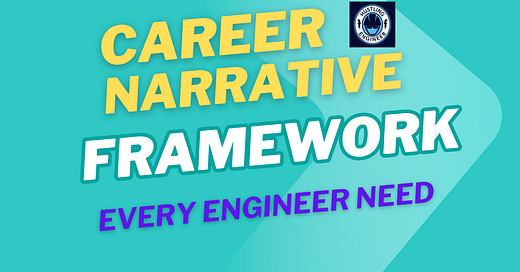4-Part Career Narrative Framework Every Engineer Needs
How to Craft a Career Narrative That Gets You Hired or Promoted
✨ The Myth Most Engineers Believe
"My work will speak for itself."
Let’s be honest, it won’t
Managers, recruiters, and interviewers are busy.
They don’t know the full context of what you built, the blockers you overcame, the challenges you faced, and the impact you created unless you tell that story.
And this is where most engineers miss out, not because they’re not good enough, but because they haven’t learned to tell a compelling career story.
Before we deep dive, I would like to signal boost my new E-Book
50% off on “The Ultimate Guide to Study in USA”
If you are planning to pursue your education in the USA and feeling overwhelmed by the process, this E-Book is to make your journey smoother
🚀 Why Your Career Narrative Matters
Whether you're chasing your next role, a promotion, or a career switch, your narrative does the following:
Shows trajectory: People care less about where you are and more about how far you've come and where you're headed.
Communicates your value: Instead of just mentioning fancy tech words, you help others understand why your work mattered.
Builds trust: When you tell your story with structure and intention, you come across as a growth-oriented individual.
💡 Great engineers ship code but exceptional engineers can explain the “why” and “how” behind it.
🧰 The 4-Part Career Narrative Framework
Let’s break it down
1. Where You Started
Set the Stage
Give a quick overview of your entry point into tech. Keep it short, human, and relatable.
“I started as a backend developer at Tesla, working mostly with Node.js and PostgreSQL. I joined as a fresher, focused on building internal tools and learning how real-world systems work.”
✅ Key tips:
Talk about your starting point (first role, company type, stack).
Mention what you were learning or building at the time.
Keep it humble and grounded.
2. How You’ve Grown
Show Your Trajectory
Now zoom out and talk about how your role, mindset, and skills evolved. Think about:
Increasing ownership
New types of problems
Broader scope
Learning from failures
“Over the years, I moved from just executing tasks to leading projects. I became the go-to person for performance bottlenecks and gradually started owning services end-to-end — from design to deployment. I also mentored a few junior engineers and drove knowledge-sharing across the team.”
✅ Key tips:
Show how your skills evolved (technical + behavioral).
Mention leadership, influence, or decision-making moments.
Quantify when possible (e.g., “led a team of 4,” “reduced build time by 40%” etc).
Keep reading with a 7-day free trial
Subscribe to The Hustling Engineer to keep reading this post and get 7 days of free access to the full post archives.




